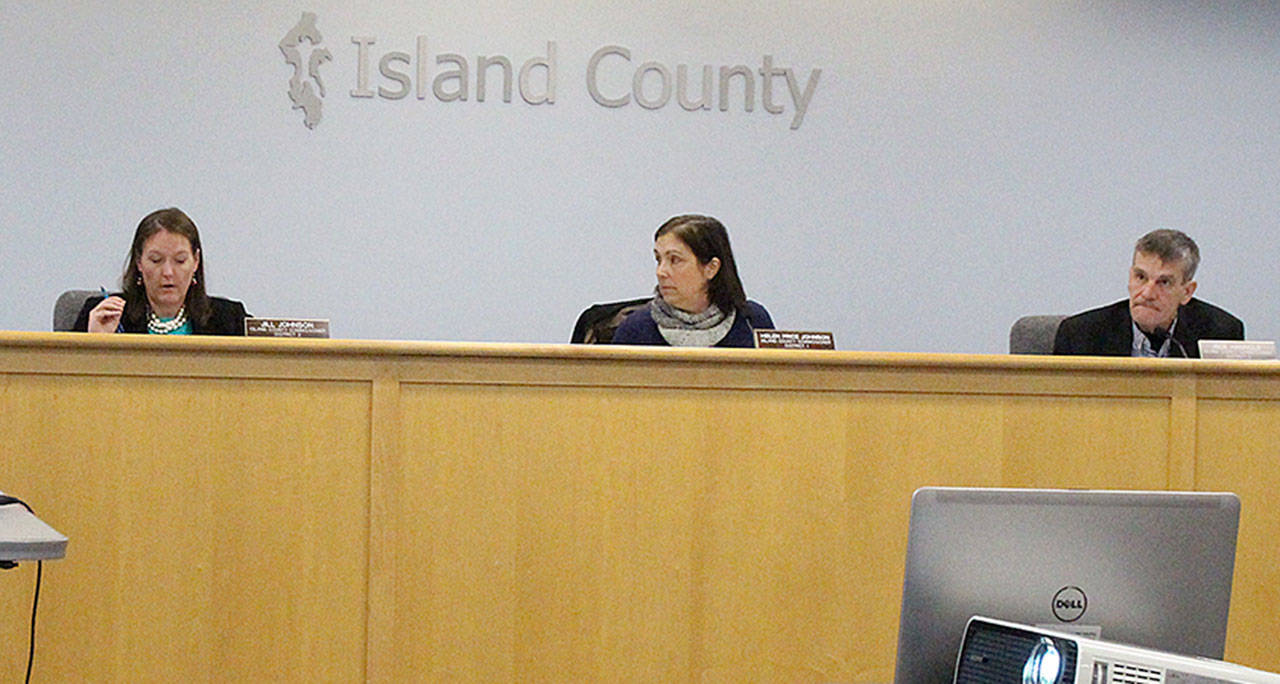Living near rural wedding venues, neighbors may still hear the Macarena, but with some new limitations under newly adopted updates to the county code.
New definitions, a new category and some clarified standards are included in the updated rural event regulations.
Island County commissioners adopted the more than 30-page document in a 2-1 vote Tuesday after a meeting that lasted around three and half hours.
“This has been a long and difficult road at times,” Commissioner Rick Hannold said. “I think what a lot of it comes down to is communities getting to know and understand each other.”
Approximately 300 comments were taken during the update process, which lasted over a year, according to Assistant Planning Director Beverly Mesa Zendt.
Hannold and Commissioner Jill Johnson voted in favor of the new language, both saying it struck a desirable balance between industry interests and neighbor protections.
Commissioner Helen Price Johnson voted against it, saying she felt more work needed to be done to create a better balance.
“I really don’t think we’ve quite hit it, but we are 80 percent of the way there,” Price Johnson said.
She said there could be more flexibility and scalability for the frequency of events allowed at different venues.
Many of those who spoke asked the commissioners to delay adoption, both those who thought it was too restrictive and people who thought it wasn’t restrictive enough.
“It’s not vote-worthy today” said Rita Comfort, owner of Comforts of Whidbey winery. “If you have 10 events, if you have one more that’s tens of thousands of dollars into our local economy by just one event.”
She argued vendors for these larger events had not had a chance to weigh in on the effect to their industry. A South Whidbey wedding planner and florist also spoke and said people in her industry hadn’t been reached out to during the process.
Comfort vouched for more flexibility in the number of events allowed, especially if they happen in the winter because there’s less impact.
The new code states that rural commercial events held between June and September cannot happen more than two times per month and not on more than two consecutive weekends. Permit applicants may request additional outdoor events during this time period if they meet a series of conditions, including a 1,000-foot separation from all adjacent residences.
Henry TePaske, an owner of The Ducken Farm, said during the public hearing that the summer months shouldn’t be as limited.
“I only have a window of opportunity to make money on that event center, and that’s during the four months,” TePaske said.
The category “rural commercial event” is new to Island County code, and refers to a middle category between one-time special events and rural event centers that are allowed to host a nearly unlimited number of events throughout the year. Many venues such as wineries and farms fall into this category and had been operating under a temporary use event permit. The code will require these permit holders to switch to the new type but will allow them to continue hosting events at the approximately the same level they had been.
Some who spoke Tuesday argued that these rural venues shouldn’t be allowed to continue to host large events, such as weddings.
“The whole idea of being up here is the quiet,” said Linda Eckhart, a neighbor to the Comforts’ winery.
Six speakers said either fewer events should be allowed or there should be tighter restrictions on them. Around 12 were in favor of allowing more events or looser restrictions on what is considered an event.
Gatherings consisting of less than 35 percent of the venue’s approved capacity that are either contained indoors or don’t use sound equipment won’t count toward the 10 total.
Commissioner Helen Price Johnson said at the meeting she thought 10-event limit wasn’t necessarily appropriate for all venues, even with the exceptions, and it should be a number that can adjust based on a number of factors.
“I really was hoping for more scalable numbers for frequency and I don’t think we’ve hit that,” she said.
Price Johnson also voiced support for allowing rural event centers, which are allowed the highest number of events, on areas zoned commercial agriculture and rural forest. The code currently doesn’t allow this use, but a significant number of comments throughout the process requested this change.
The planning commission included it in its recommendation to the board, but the code remained unchanged after Johnson and Hannold rejected the idea.
Karen Bishop, owner of Ebey Road Farm and manager of the Whidbey Island Conservation District, told commissioners that the ability to use old structures that can’t be used for farming practices any more for events would help farmers financially.
“Events on farms, whether occasional or often, are an important part of farms’ business plans for economic sustainability,” Bishop said.
Hannold and Johnson said the permit is incompatible because of state laws that require commercial agriculture to be the primary use in that zone.
“Having a rural event center is a whole different business model than having a farm,” Hannold said.
The regulations will be reviewed for effectiveness within three years of adoption. Johnson said the regulations allowed for more flexibility and opened more doors than they closed, citing the added exemptions on events associated with agricultural production, the smaller gathering under 35 percent of capacity and the five nonprofit events.
“I want to be clear that this is a code the really proactively creates various levels of opportunity for an industry to exist,” Johnson said.



